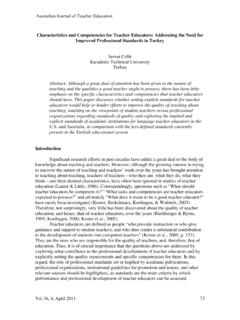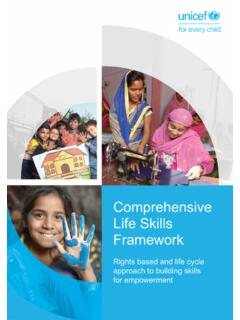Transcription of Continuing Professional Development (CPD) of Teacher ...
1 ShanlaxInternational Journal of Education shanlax#SINCE1990 Professional Development (CPD) of Teacher educators in 21st Professor of EducationNew Horizon College of Education (Aided), Bangalore, Karnataka State, IndiaAbstractEducation is a pre-requisite for the Development of a country. The Teacher is the backbone of the education system and is the architect of society. The progress of an organization depends upon the quality of its teachers. Today s child is tomorrow s citizen of the country. Teacher educators of the Colleges are the makers of the future teachers who are bound to have a vital influence on the children learning, shaping their attitude, and developing desirable behavior. To prepare efficient teachers in the 21st century, Teacher educators need to be constantly topnotch in their profession. It can be possible, only if they can sustain their Continuing Professional Development (CPD). It involves on-going divergent activities (formal, non-formal and informal) that aim at developing the Teacher educator s intellectual abilities (cognitive domain), self confidence, attitude, values, and interest (affective domain) and skills and competencies (psychomotor domain) for improving per-sonality and to carry out the responsibilities of the teaching profession properly in accordance with the changing times and needs of the prospective teachers and society.
2 The present paper comes out with diverse programs and activities for Teacher educators to sustain their CPD in the advent of complexities continually arising in the field of Teacher education in the 21st : Teacher educators , Prospective Teachers, Continuous Professional Development (CPD), and 21st Education is a pre-requisite for the Development of a country. It is a well-established fact that it is mainly through education that people can be made to develop an in-depth awareness, favorable attitudes, values, participate in effective decision making and develop capabilities which help to contribute the societal welfare. The Teacher is the backbone of the education system and is the architect of society. The progress of an organization depends upon the quality of its teachers. Today s child is tomorrow s citizen of the country. Nothing can match and replace the excellent task of the Teacher in building the future of the children.
3 Student-teachers are the future teachers who are bound to have a vital influence on the children learning, shaping their attitude, and developing desirable behavior. Teacher educators of the Colleges are the makers of these future teachers. They can do justice to their profession, only if they can take up and sustain their Continuing Professional Development (CPD). Continuing Professional Development (CPD) According to Organization for Economic Co-operation and Development (OECD) Teaching and Learning International Survey (TALIS, 2009), CPD can be defined as the one which involves those activities that develop an individual s skills, knowledge, expertise and other characteristics as a Teacher . OPEN ACCESSV olume: 7 Issue: 4 Month: SeptemberYear: 2019P-ISSN: 2320-2653E-ISSN: 2582-1334 Received: : : : Srinivasacharlu, A. Continuing Professional Development (CPD) of Teacher educators in 21st Century. Shanlax International Journal of Education, vol.
4 7, no. 4, 2019, pp. 29 : This work is licensed under a Creative Commons Attribution-ShareAlike International LicenseShanlaxInternational Journal of Education shanlax#SINCE1990 According to Melanie Allen (the UK, 2009), CPD refers to the process of tracking and documenting the skills, knowledge, and experience that teachers gain both formally and informally as they work, beyond any initial training. It s a record of what they experience, learn, and then apply. Thus CPD can be comprehensively defined as the one involves on-going divergent activities (formal, non-formal and informal) that aim at developing the Teacher educator s intellectual abilities (cognitive domain), self confidence, attitude, values, and interest (affective domain) and skills and competencies (psychomotor domain) for improving personality and to carry out the responsibilities of the teaching profession properly in accordance with the changing times and needs of the prospective teachers and society.
5 Need and Importance of CPD The teaching profession in the 21st century sees a significant sea change thanks to many factors of different hues and advent of digital tools. It will be a grave mistake for Teacher educators to ignore these developments and their impact on teaching. Thus to prepare efficient future teachers in the 21st century, the Teacher educators are required to continually update and equip themselves with ever-increasing skills and competencies to always remain topnotch in their profession and do justice to society. This can be possible, only if they can take up CPD. Thus CPD ensures the following advantages on the part of Teacher CPD prepares the Teacher educator, again and again, to keep abreast with the latest developments. 2. The professionalism of Teacher educators can be reinforced by continuous further experience and in-service education during their service period.
6 3. It re-orients Teacher educators with up-to-date knowledge and latest developments in the field of It equips Teacher educators with ever-increasing digital skills and competencies to manage hyper-connected, knowledge environment to best prepare future teachers for the 21st Century, a world where the only constant they know is change. 5. It helps Teacher educators to acquire skills in using the latest strategies, models, and techniques in teaching. 6. It helps the Teacher educators to improve their scientific temper to be followed in their actions and It upgrades the knowledge and abilities among Teacher educators in organizing seminars, conferences, symposium, workshops, It increases the competency of Teacher educators in motivating and providing guidance and counseling for prospective teachers. 9. It enables Teacher educators to contribute and participate in the construction and revision work of curriculum construction, preparation, and revision of textbook, It upgrades competencies among Teacher educators in doing a continuous and comprehensive evaluation, criterion and norm-referenced evaluation, electronic/on-line evaluation of the students It strengthens and upgrades abilities among Teacher educators in playing numerous roles like a guide, educator, trainer, resource person, counselor, facilitator, researcher, community leader to help prospective teachers to become an intellectual, skillful and value-based Teacher and citizen in this rapidly changing world.
7 Programs and Activities for the CPD of Teacher educators Following are some of diverse programs and activities suggested for Teacher educators to pursue their CPD in the advent of complexities continually arising in the field of Teacher education in the 21st century: Learning at the Institution: Teacher educators at their institution can observe theory class, demonstrations and laboratory work, micro-teaching, etc. conducted by the senior colleagues and experts. They can take an active part in organizing the curricular, co-curricular, and extensions activities undertaken by the institution. They can seek advice and help from the experienced Teacher educators and subject experts for bringing improvement in their teaching. They can even take up the responsibilities such as IQAC Coordinator and Programme ShanlaxInternational Journal of Education shanlax#SINCE1990 Programme In-charge for IGNOU Programs, staff coordinator/advisor.
8 Orientation Programme and Refresher Courses: The UGC-Human Resource Development Centre (UGC-HRDC) at select universities organizes orientation programs and refresher courses on thrust areas for in-service teachers and also for newly appointed teaching faculty regularly. The orientation program (which is of 28 days) is intended to teach in the young teachers the quality of self- reliance through awareness of the social, intellectual and moral environment as well as to discover self-potential and confidence. It also contributes to the Teacher awareness of the problems of the Indian society and the role of education, higher education leaders, and educators in the resolution of these problems to achieve desired goals in national Development . The UGC-HRDC also conducts a refresher course (which is of 21 days) in different subjects including Education.
9 It strives to upgrade and update the knowledge of serving teachers in various fields of their specialization. The contents of the courses are objectively selected to enlighten teachers about the contemporary developments in their subjects and also to provide an understanding of the emerging areas of research. The course also provides opportunities for serving teachers to exchange experiences with their peers and mutually learn from each other. Thus it also acts as a forum to abreast of the latest advances in the subjects, technological spin-off, etc. Content Courses: Content courses are conducted to upgrade the Teacher educators in their specialization in terms of knowledge of the latest developments, current issues, and their trends and application and their relevance to teaching. These courses are organized with the help of resource persons in a particular area of discipline.
10 Seminars and Conferences: Seminars provide a formal platform to Teacher educators to present papers, exchange ideas, and discuss on the various aspects of a particular topic and problems along with other Teacher educators and resource personnel. Conferences provide a broad formal platform to Teacher educators . Beside paper presentation, they also offer for a panel discussion, exhibition, etc. Experienced Teacher educators can avail the opportunity either to chair or act as a rapporteur for technical sessions during seminars and conferences, wherein the paper presentation by various Teacher educators can provide new knowledge to them. Also, Teacher educators can avail the opportunity as a resource person to speak on the topic of contemporary importance. Workshops: Teacher educators can attend workshops which provide reliable/practical dimension to the discussion on the various aspects of a particular topic and problems by the group of participants.
















